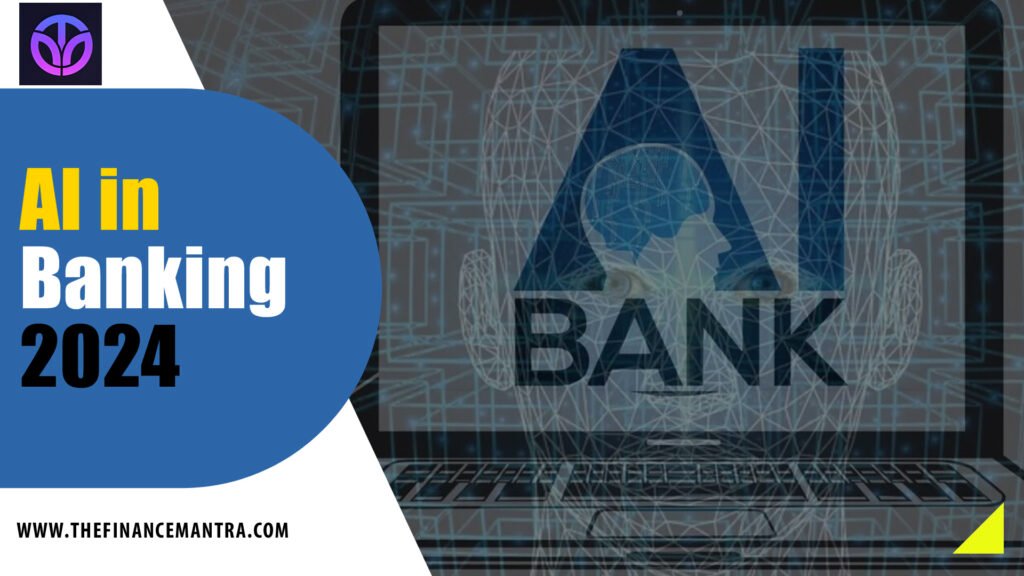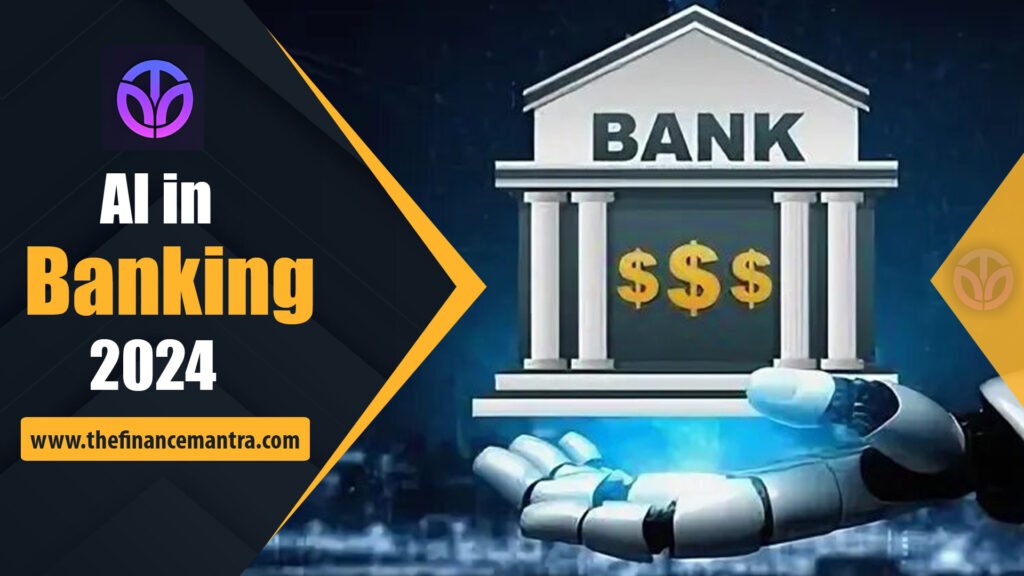AI in Banking: Artificial Intelligence (AI) has become a buzzword in various industries, but perhaps none are experiencing its transformative power as profoundly as the banking sector. With rapid advancements in AI technologies, banks are leveraging these innovations to enhance efficiency, reduce costs, and provide superior customer experiences. In this article, we’ll explore how AI is revolutionizing the banking industry, focusing on its applications, benefits, challenges, and the future of finance.
What is AI in Banking ?
AI in Banking: Artificial Intelligence refers to the simulation of human intelligence in machines that are programmed to think and learn like humans. In banking, AI encompasses a range of technologies including machine learning (ML), natural language processing (NLP), and robotic process automation (RPA). These technologies are used to analyze data, predict trends, and automate processes, thereby reshaping how banks operate.

Key Applications of AI in Banking
- Fraud Detection and Prevention One of the most critical applications of AI in banking is fraud detection. Traditional methods often rely on historical data and rules-based systems, which can be slow and less effective. AI enhances these systems by analyzing vast amounts of transactional data in real time to detect unusual patterns or anomalies. Machine learning algorithms can identify potentially fraudulent activities more accurately and quickly than manual methods, reducing the risk of financial losses and improving security.
- Customer Service and Chatbots Customer service has always been a crucial aspect of banking. AI-powered chatbots and virtual assistants are transforming this area by providing 24/7 support and handling a wide range of queries. These chatbots use natural language processing to understand and respond to customer inquiries, offering personalized assistance without the need for human intervention. This not only enhances customer satisfaction but also reduces operational costs for banks.
- Personalized Financial Advice AI is revolutionizing personal finance by providing tailored advice and recommendations. Algorithms analyze a customer’s spending habits, financial goals, and investment preferences to offer personalized advice. Robo-advisors, powered by AI, create customized investment portfolios and provide financial planning services that were once available only through human advisors. This democratizes access to financial advice and helps individuals make informed decisions.
- Risk Management Managing risk is a fundamental aspect of banking. AI helps in assessing and managing risks by analyzing large datasets to identify potential risks and predict future trends. For example, AI models can evaluate creditworthiness more accurately by considering a broader range of factors beyond traditional credit scores. This enables banks to make more informed lending decisions and mitigate potential losses.
- Operational Efficiency AI-driven automation is streamlining various banking processes, such as loan approvals, compliance checks, and data entry. Robotic process automation (RPA) handles repetitive tasks with high accuracy and speed, freeing up human resources for more strategic activities. This leads to increased efficiency, reduced errors, and cost savings for banks.
- Enhanced Security Security is a top priority for banks, and AI plays a significant role in enhancing it. AI technologies monitor transactions for suspicious activities, detect potential breaches, and protect sensitive customer information. Advanced algorithms analyze patterns in data to identify and respond to threats in real time, ensuring that banking systems remain secure.
Benefits of AI in Banking
- Improved Customer Experience AI enhances customer experience by providing faster, more accurate, and personalized services. Customers benefit from quicker responses to their queries, personalized financial advice, and seamless transaction experiences. This leads to higher customer satisfaction and loyalty.
- Cost Reduction By automating routine tasks and optimizing processes, AI helps banks reduce operational costs. For instance, chatbots reduce the need for large customer service teams, and AI-driven analytics minimize the resources required for risk assessment and fraud detection.
- Increased Accuracy AI algorithms are designed to process and analyze vast amounts of data with high accuracy. This reduces the risk of human error and improves decision-making. In areas like fraud detection and credit assessment, AI provides more precise results compared to traditional methods.
- Scalability AI solutions can scale effortlessly to handle increasing volumes of data and transactions. As banks grow and expand their operations, AI systems can adapt to the changing demands without requiring significant infrastructure changes.
- Innovation and Competitiveness Embracing AI allows banks to stay competitive in a rapidly evolving industry. By leveraging the latest technologies, banks can offer innovative products and services that attract new customers and retain existing ones.
Challenges and Considerations
- Data Privacy and Security With the increased use of AI comes the challenge of protecting customer data. Banks must ensure that AI systems comply with data protection regulations and implement robust security measures to safeguard sensitive information.
- Bias and Fairness AI systems can inadvertently perpetuate biases present in historical data. Banks need to be vigilant in ensuring that their AI models are fair and do not discriminate against any group of customers. Regular audits and updates are necessary to address potential biases.
- Integration with Legacy Systems Many banks operate with outdated legacy systems that may not seamlessly integrate with modern AI technologies. The process of updating or replacing these systems can be complex and costly, requiring careful planning and execution.
- Regulatory Compliance The banking industry is heavily regulated, and AI implementations must comply with existing regulations and standards. Banks must navigate complex regulatory landscapes and ensure that their AI systems meet all legal requirements.
- Ethical Considerations The use of AI in banking raises ethical questions, such as the potential for job displacement and the impact on decision-making processes. Banks must consider these ethical implications and address them proactively.
The Future of AI in Banking
AI in Banking: The future of AI in banking holds immense potential. As technology continues to advance, we can expect even more innovative applications and improvements in the industry. Here are some key trends to watch:
- AI-Driven Personalized Banking Future AI systems will offer even more personalized banking experiences, using advanced algorithms to tailor products and services to individual preferences. This will enhance customer satisfaction and drive growth for banks.
- Blockchain Integration The integration of AI with blockchain technology could revolutionize banking operations. AI can enhance the efficiency of blockchain networks, improve transaction verification, and ensure greater security.
- AI and Big Data Analytics The combination of AI and big data analytics will provide deeper insights into customer behavior, market trends, and operational efficiency. Banks will be able to make more informed decisions and develop innovative strategies.
- Enhanced Cybersecurity AI will continue to play a crucial role in enhancing cybersecurity measures. Advanced algorithms will detect and respond to threats more effectively, protecting banks and their customers from cyber-attacks.
- Regulatory Evolution As AI becomes more prevalent in banking, regulatory frameworks will evolve to address new challenges and opportunities. Banks will need to stay informed about regulatory changes and ensure compliance with emerging standards.
Conclusion
AI in Banking: AI is undoubtedly transforming the banking industry, offering a range of benefits from enhanced customer experiences to improved operational efficiency. While challenges remain, the potential of AI to revolutionize finance is immense. As technology continues to advance, banks that embrace AI and adapt to its evolving capabilities will be well-positioned to thrive in the future of finance.
By leveraging AI, banks are not only improving their own operations but also reshaping the way financial services are delivered to customers. The journey of AI in banking is just beginning, and its impact will continue to grow, driving innovation and creating new opportunities in the financial sector.
(FAQs) about AI in the Banking Industry
1. What is AI in banking?
Answer: AI in banking refers to the use of artificial intelligence technologies to enhance various aspects of financial services. This includes machine learning, natural language processing, and robotic process automation to improve fraud detection, customer service, risk management, and operational efficiency.
2. How does AI help in fraud detection?
Answer: AI helps in fraud detection by analyzing large volumes of transaction data in real-time to identify unusual patterns or anomalies. Machine learning algorithms can detect potential fraudulent activities more accurately and quickly than traditional methods, reducing the risk of financial losses.
3. What are chatbots and how are they used in banking?
Answer: Chatbots are AI-powered virtual assistants that interact with customers via text or voice. In banking, chatbots provide 24/7 customer support, handle routine queries, and perform tasks such as checking account balances or processing transactions, thereby improving customer service and reducing operational costs.(AI in Banking)
4. How does AI improve customer service in banks?
Answer: AI improves customer service by providing personalized and efficient support. AI-powered systems can respond to customer inquiries quickly, offer tailored financial advice, and automate routine tasks, leading to a better overall experience for customers.
5. What is a robo-advisor?
Answer: A robo-advisor is an AI-powered platform that provides automated financial planning and investment management services. It uses algorithms to create and manage investment portfolios based on a customer’s financial goals, risk tolerance, and preferences, often at a lower cost than traditional financial advisors.(AI in Banking)
6. Can AI be used for risk management in banking?
Answer: Yes, AI is used for risk management by analyzing large datasets to assess and predict potential risks. AI models evaluate factors such as creditworthiness and market trends, enabling banks to make more informed decisions and manage risks more effectively.
7. What are the benefits of using AI in banking?
Answer: The benefits of using AI in banking include improved customer experience, cost reduction, increased accuracy, enhanced security, and greater operational efficiency. AI helps banks streamline processes, reduce errors, and provide personalized services to customers.
8. What challenges do banks face when implementing AI?
Answer: Banks face several challenges when implementing AI, including data privacy and security concerns, potential biases in AI models, integration with legacy systems, regulatory compliance, and ethical considerations. Addressing these challenges requires careful planning and management.
9. How does AI contribute to operational efficiency in banks?
Answer: AI contributes to operational efficiency by automating routine and repetitive tasks such as data entry, loan approvals, and compliance checks. This reduces the need for manual intervention, speeds up processes, and lowers operational costs.(AI in Banking)
10. What role does AI play in enhancing cybersecurity for banks?
Answer: AI enhances cybersecurity by monitoring transactions for suspicious activities, detecting potential breaches, and protecting sensitive customer information. Advanced algorithms analyze data patterns to identify and respond to security threats in real-time.
11. Will AI replace human jobs in banking?
Answer: AI may lead to changes in job roles within banking, but it is more likely to complement human work rather than replace it entirely. AI handles repetitive tasks, allowing human employees to focus on more strategic and complex activities. The industry will likely see a shift in job functions rather than a complete replacement of human roles.(AI in Banking)
12. How is AI expected to shape the future of banking?
Answer: AI is expected to shape the future of banking by driving innovation, enhancing customer experiences, and improving operational efficiency. Future trends include more personalized banking services, integration with blockchain technology, advanced data analytics, and enhanced cybersecurity measures.
13. Are there any regulatory concerns with the use of AI in banking?
Answer: Yes, there are regulatory concerns related to AI in banking, including data protection, compliance with financial regulations, and ethical considerations. Banks must ensure that their AI systems adhere to regulatory standards and address any potential issues proactively.
14. How can banks ensure the ethical use of AI?
Answer: Banks can ensure the ethical use of AI by implementing guidelines and frameworks that promote fairness, transparency, and accountability. Regular audits, bias checks, and adherence to ethical standards can help address potential issues and ensure responsible AI practices.
15. What should banks consider before adopting AI technologies?
Answer: Before adopting AI technologies, banks should consider factors such as the integration with existing systems, data privacy and security, regulatory compliance, potential biases in AI models, and the overall impact on operations and customer experience. Careful planning and a clear strategy are essential for successful implementation.(AI in Banking)


